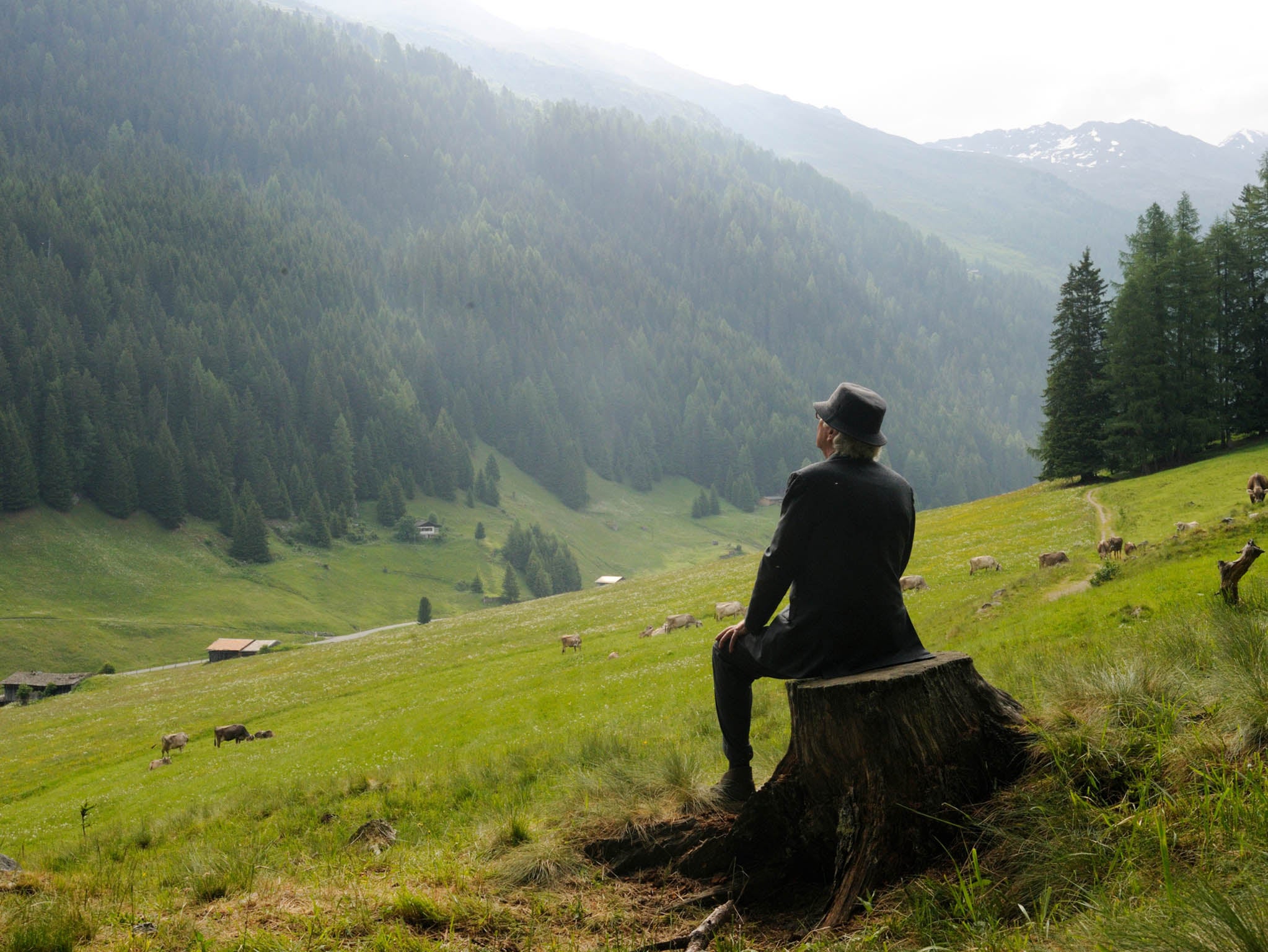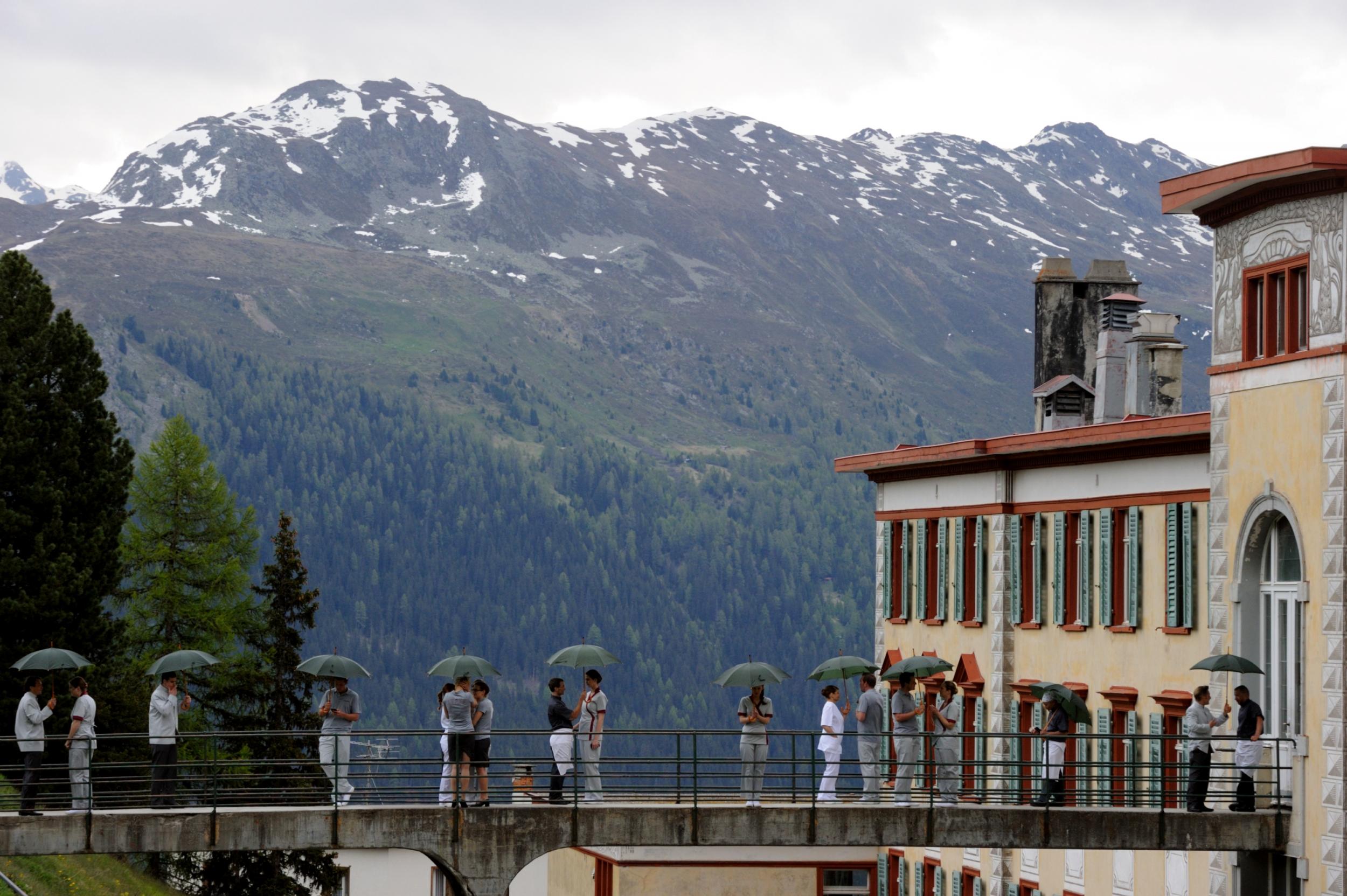On the trail of new film 'Youth' in the Swiss Alps
In his latest movie role, Michael Caine attempts to refresh both mind and body in the mountains

Your support helps us to tell the story
From reproductive rights to climate change to Big Tech, The Independent is on the ground when the story is developing. Whether it's investigating the financials of Elon Musk's pro-Trump PAC or producing our latest documentary, 'The A Word', which shines a light on the American women fighting for reproductive rights, we know how important it is to parse out the facts from the messaging.
At such a critical moment in US history, we need reporters on the ground. Your donation allows us to keep sending journalists to speak to both sides of the story.
The Independent is trusted by Americans across the entire political spectrum. And unlike many other quality news outlets, we choose not to lock Americans out of our reporting and analysis with paywalls. We believe quality journalism should be available to everyone, paid for by those who can afford it.
Your support makes all the difference.The Alpine orchestra plays out in a cacophony of jangling cow bells, mellow mooing and chattering woodpeckers. A retired composer, Fred Ballinger, seated on a tree stump in a colourful Swiss meadow, draws them together with his hands.
Fred (Michael Caine), the main character in the new film Youth, is on holiday with his best friend, Mick (Harvey Keitel), a film-maker, in a spa hotel in the Swiss Alps. While Mick strives to finish his latest screenplay, Fred fends off invitations from the Queen to perform a piece for Prince Philip’s birthday, and undergoes a programme of treatments to “get back in shape”. The friends wander Alpine pastures, musing on their lives, bumping into celebrities, including Paloma Faith, along the way.
To create the ultimate retreat for this motley crew, the director, Paolo Sorrentino, knitted together two historic hotel resorts in mountainous eastern Switzerland – the Waldhaus Flims Resort & Spa and the Berghotel Schatzalp, a few valleys away in Davos.
“Paolo Sorrentino had concrete ideas about how the hotel should look in the film,” explains co-producer Anne Walser. “The Waldhaus Flims had the ideal park and spa, while the Berghotel Schatzalp offered the perfect view.”
I start my January visit at the Waldhaus, a 19th-century spa hotel resort in a wooded park above the Alpine village of Flims. This is where the Youth cast, which also includes Rachel Weisz, Jane Fonda and Paul Dano, stayed during filming. At the time, in spring 2014, the meadows were laced with flowers, but today it’s wintry.
Lured by the sumptuous scenes of steam rooms, saunas and heated pools in Youth, all filmed at the Waldhaus spa, I de-robe and plunge in. As I swim in the indoor pool, which sits within a sleek glass cube, steam drifts from the pool outside, towards the Art Nouveau pavilion across the garden. Its turrets are gilded in sunlight and make a sculpted counterpart to the chiselled, snow-covered crags of the Flimserstein towering behind it.
The resort’s décor is an ode to period features, with glass chandeliers, wing-backed chairs and bookcases stacked with hardbacks. I’m glad, given the cold, that the buildings – including one five-star and two four-star hotels, six restaurants and a spa – are connected by underground passages and covered walkways.
Beyond the gates is Flims, its chalets and new builds strewn across a south-facing shelf above the Rhine Valley. The serrated Tschingelhörner summits fan out like an accordion high above. Just visible is the Martinsloch, a 19-metre hole in the cliffs that the rising sun bursts through twice a year – in March and September. The landscape was created by a huge landslide – thought to be the biggest in Europe – almost 10,000 years ago.
There’s skiing at nearby Laax and a network of cross-country trails, but I opt for a stroll to the Caumasee, one of seven lakes in the area. I descend through silent woodland, until at last, the lake comes into hazy view. Renowned for its turquoise hue, today it is completely frozen apart from one corner. Here, its steely depths reflect the swooping, snow-laden branches of the wooded island in the middle of the lake. It is nothing short of a wonderland, yet in Youth, Flims filming was restricted to the Waldhaus. Instead, most outdoor scenes were shot in the meadows around the Schatzalp.
Though they’re only 42km apart as the crow flies, it takes two hours to navigate the warren of valleys between the two hotels, by public transport. The final leg of the journey is by a 116-year-old funicular from central Davos. In four minutes it thrusts me from the bright lights of the resort best known for hosting the World Economic Forum each January, up to an altitude of 2,000 metres, almost to the doorstep of this Belle Epoque beauty. Jazz piano drifts from a window in the 150-metre-long façade, which has the best views in Davos. A cat plays amid ankle-deep snow in what, during summer, is a botanical garden, home to 5,000 types of Alpine plants – including herbs used in the hotel’s five restaurants.

“Welcome to the ‘Magic Mountain’,” says the receptionist, referring to a Thomas Mann novel. It centres on the Schatzalp in its early days as a luxury sanatorium for people with tuberculosis, who were thought to benefit from the clean air and climate here: there are two extra hours’ sunshine on fine days compared with anywhere else in Davos. But by the 1940s, after the introduction of penicillin, patient numbers were dwindling, and in 1954, the Schatzalp became a hotel. “It wasn’t an easy transition,” the director, Mark Linder, says. “At first, people were worried they would catch germs.”
The hotel has a ski resort, Slow Mountain, with almost seven miles of pistes, which only open when there is enough natural snow, and there’s also a 1.8-mile sledge run on which, the story goes, TB sufferers made their final journey by toboggan. A thrilling way to go, though this was an invention of Mann’s.
Little remains of the sanatorium, but there is still a glorious sense of the Fifties. The hotel exudes past grandeur in its wide corridors and patterned doors. Standing in the extravagantly white dining room makes me feel like royalty. Rooms are more modest, but their simple decor and balconies with views instead of mod-cons are a nice escape from reality. From my balcony, I watch as piste bashers trail up and down the bulky Rinerhorn summit like fireflies. The view concertinas into a jagged profile that recedes into valley after valley. I can almost see as far as Lengmatta – a meadow dotted with spycher (wooden huts) that is the setting for Fred’s iconic conducting scene. Apart from the gentle rustle from a chilly breeze, it’s perfectly silent; no sign of an Alpine orchestra.
‘Youth’ is released on 29 January
Join our commenting forum
Join thought-provoking conversations, follow other Independent readers and see their replies
Comments